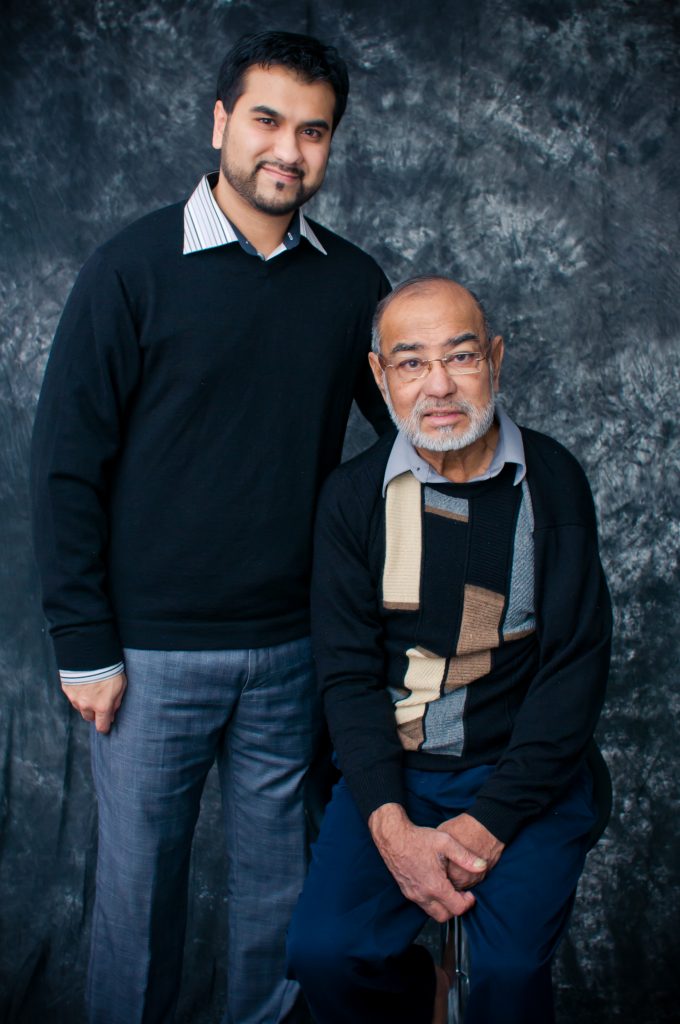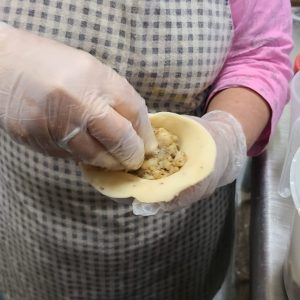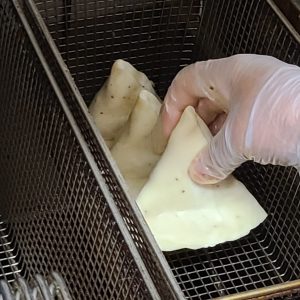10 mins | 2,100 words
By: Randy Gaudreau
 When asked about his background, Owais Khan, owner of Ottawa Samosa, says his family’s story is in many ways “a typical first-generation immigrant story,” with his parents immigrating from India and working long hours in a variety of roles to raise their growing family.
When asked about his background, Owais Khan, owner of Ottawa Samosa, says his family’s story is in many ways “a typical first-generation immigrant story,” with his parents immigrating from India and working long hours in a variety of roles to raise their growing family.
But the entrepreneurial spirit and passion that drove his father was anything but typical.
And it seems this spirit has been passed down to Owais and his wife Rumana, who despite the challenges, remain committed to carrying out the mission of bringing authentic, handmade Indian samosas to the Ottawa region through Ottawa Samosa.
***
After coming to Chicago in the early 1970s, Owais’ father Sadat Khan came to Canada to pursue new opportunities in Toronto. He took on several positions including a role as a suit salesman with Tip Top Tailors and a job in the mailroom of the Bank of Montreal – from which he worked up to become the manager, without a college (or even high school) diploma.
But even through all this, he still found time to scratch the food industry “entrepreneurial itch” he always had, by co-owning and operating a restaurant in the Danforth area of Toronto named Meezan.

Owais Khan, and his passionate father Sadat Khan
“Working one job with a large family just doesn’t cut it,” Owais says in reflection during a virtual call. “All of this work ethic has trickled down to his kids, and that’s why we all have our own side hustle,” he said.
Owais himself holds a Biopharmaceutical Sciences degree with a concentration in Genomics and works a related full-time position with Health Canada. And he says the five children of the family were “all raised with the expectations of getting a university degree but having the knowledge of how to run a household.”
And a large part of the household responsibilities centred around kitchen duty – fuelling a natural passion in the family for traditional Indian food.
“Cooking was one of the things that we were all taught, and we all grew up with,” said Owais. “So, we learned how to cook typical Indian food dishes at a young age, and now, it’s no surprise three of us have a side hustle that involves Indian food.”
Even through adversity – the passion continued
In 1994, Owais’ father suffered a stroke that left him partially paralyzed on the left side after a year of rehabilitation and took him away from his position at the bank and his busy life in Toronto.
Though it took a toll physically, even that only momentarily slowed him down as he’d soon join his son in Ottawa, and together, they’d find a way to produce quality Indian food – without needing a restaurant.
Bringing real samosas to the Ottawa area
Owais moved to the Ottawa region in 1999 to attend the University of Ottawa. And being a university student on a budget, he’d regularly bring his family’s samosas back from Toronto and freeze them and prepare them for friends and family.
While he and his friends enjoyed his family’s samosas, Owais noticed although it was easy enough to find samosas in the grocery store, they often weren’t up to the standard he was accustomed to.
 “Just because it’s a triangle shape, that doesn’t automatically make it a samosa,” Owais said with a chuckle. “A lot of people are selling a product that they call a samosa, but from what I was taught, a samosa has to be handmade. If you have something that comes out of a machine you can call it a perogy, you can call it a beef pie, you can call it anything else, but I would say that you can’t call that a samosa just because it’s a triangle in shape.”
“Just because it’s a triangle shape, that doesn’t automatically make it a samosa,” Owais said with a chuckle. “A lot of people are selling a product that they call a samosa, but from what I was taught, a samosa has to be handmade. If you have something that comes out of a machine you can call it a perogy, you can call it a beef pie, you can call it anything else, but I would say that you can’t call that a samosa just because it’s a triangle in shape.”
By the time his father arrived, the idea of filling the need for traditional samosas in Ottawa started to take shape. Even after suffering a stroke, Owais’ father remained driven to be involved in the food industry, and according to Owais he still “needed to be talked out of opening a restaurant.”
“By the time we were coming up with the whole Ottawa Samosa idea, he was ready,” Owais said. “My dad said, ‘Let’s do something! There’s this need in Ottawa for good quality samosas. And we can do that!’ And the idea was focused enough that we could focus on one staple product of Indian food without him having to open up a full-on restaurant.”
Carrying on family traditions – through Ottawa Samosa
Sadly, Owais’ father passed away during a routine procedure before Ottawa Samosa was officially underway. But he remained entrepreneurially driven, up until his last days driven, and along the way, he taught Owais’ wife Rumana the secrets of making his famous samosas.
Owais says that a family friend in Toronto, who also had experience making traditional samosas by hand also pitched in, and once a month, they’d bring the samosas to Ottawa. Though friends and family were still the core consumers of the tasty samosas, it didn’t take long for the word to spread – and for an opportunity to be something more to present itself.
“We didn’t have a commercial kitchen, and we were thinking of just staying at that level,” said. “But we grew really fast, and people were starting to refer us to their friends and then their friends – and next thing you know we were getting actual waiting lists.”
“So, we thought, ‘OK. We need to have a proper commercial kitchen.’”
When space is an issue
However, finding a commercial space in the West End of Ottawa made for a challenging, nomadic start for Ottawa Samosa. They started off by borrowing kitchen spaces of restaurants they frequented and were soon referred to shared kitchen spaces such as Cauldron Kitchen and Stittsville’s Scrumptious Creative Catering Inc.
Eventually, in February of 2020, they found a more permanent space, in Kanata’s Kash n’ Karry, a South Asian grocery store specializing in Indian products which had a commercial kitchen in the back.
While the small production space provides a production area, there’s no service window – rather, a door at the back of the store with no handles, that people can knock on. And above it, a video screen scrolls through available options for shoppers walking by.
However limited, what the space does provide is a connected business that’s willing and able to sell fresh handmade samosas, providing the business with a sales outlet.
“The owner buys our samosas – about a hundred at a time, and we’re footsteps away, so you can’t get fresher than that,” explains Owais. “He literally has to warn his customers, ‘They just came out of the fryer, so be careful. You don’t want to burn yourself!’ So, it’s a good kind of symbiotic relationship that we have with them,” he said.
Though the location has its benefits, growing the business from the small space has its challenges – which would soon only be magnified by the COVID-19 pandemic that hit soon after they finally found the space.
The new need to reach customers at home
A reduction in traffic to the Kanata Kash N’ Karry due to pandemic restrictions meant they needed to find a way to reach consumers at home. That meant not only diversifying the menu to provide appealing at-home meals – but also finding ways to reach consumers at home and get samosas into their hands.
According to Owais, third-party food delivery services such as Skip the Dishes and Uber Eats were never originally a consideration – but in the current situation, their benefits couldn’t be ignored.
 “If you have these third-party delivery apps taking such a huge chunk of your profits, it’s not feasible, so we weren’t even considering doing that,” Owais said. “But when the pandemic hit, we thought, ‘OK, this is something that we definitely have to do’, so we signed up with all three of the delivery apps.”
“If you have these third-party delivery apps taking such a huge chunk of your profits, it’s not feasible, so we weren’t even considering doing that,” Owais said. “But when the pandemic hit, we thought, ‘OK, this is something that we definitely have to do’, so we signed up with all three of the delivery apps.”
“And I’m glad that we did,” he added. “They take that huge cut but they have a huge reach, and we’ve taken that as an opportunity to introduce ourselves to new customers and we’ll kind of throw in a coupon or something to let them know they can order directly from us. And it actually gave us a lot of exposure and an opportunity to reach an audience that we definitely wouldn’t have.”
But while getting listed on third-party services helped spread the word, Owais knew that shifting to the digital marketplace meant new challenges beyond delivery that he wasn’t prepared for. And he reached out for help.
Finding support through Invest Ottawa and Digital Main Street programs
As a graduate of Invest Ottawa’s Starter Company Plus, a four-month training program for early-stage small business owners, Owais knew that he could turn to Invest Ottawa when it came to needing help with his business.
At the onset of the pandemic, he received an email urging businesses to take advantage of the Digital Main Street ShopHERE and Future Proof programs offered for free through Invest Ottawa, thanks to the support of FedDev Ontario -and he seized the opportunity.
“I applied for both,” he said. “I thought ‘Why not?’ And I got accepted for both.”
Strengthening the online presence with ShopHERE
With the help of his sister, a professional photographer, Owais had a website set up for Ottawa Samosa using the Wix platform. But despite the beautiful photos, the website needed help on many levels.
“Sometimes for the person that creates it, they think everything makes sense. But to an outsider, it doesn’t really make sense at all,” he said. “The problem was that we didn’t have expertise on actual website development or social media marketing or content writing – any of these things,” he explained.
“So having that feedback, and then knowing somebody with knowledge on actually how to fix it, was great.”
Finding the path forward with Future Proof
Though having a fresh new website through ShopHERE was a definite improvement, the Future Proof program helped equip him with the know-how he needed to succeed online.
And apparently, it didn’t take long to see results.
“Within the first two months, it was a 20% increase in sales and a 26% increase in web traffic,” he said. “I didn’t look at the numbers before, but we use Google Analytics now and that’s something that they actually taught me how to use. You can actually see where they’re coming from, so having all that technology, we saw results right away,” he said. “And we’re still seeing it.”
And according to Owais – the program came at the right time, and the difference it made was sizable.
“It was huge,” Owais confirmed. “And the fact that it was I didn’t have to pay for it was like even better. Everyone’s so tight on their cash flow situation right now, and the ability to transform and build a strong digital presence when our foot traffic has gone down more than ever before, the timing was just right.”
 What’s next?
What’s next?
Though the small space continues to challenge growth potential, the ghost kitchen format has advantages and allows Owais to take on new opportunities under his OAK Foods brand, including landing the opportunity to provide HERO certified, fully traceable, no hormone added Halal burgers for the Kanata area.
And according to Owais – the built-in resiliency of the ‘ghost kitchen’ structure will help to weather the current pandemic conditions as well as future unknowns.
“Nobody wishes for or likes this situation of the pandemic, but you can kind of guard yourself,” he advised. “I think this type of business would strive in a pandemic and it would also strive in regular times.”
The next challenge is finding a bigger space that will allow him to increase his capacity, by adding more staff and more storage. But that doesn’t mean he’ll abandon the traditional methods central to Ottawa Samosa’s success.
“As soon as you go to a machine-made samosa, you can have mass production on a whole different level scale,” he said. “But you’re not going to be an authentic samosa, and you have to make that decision.”
“I have to be careful that I scale the business properly,” he added. “There’s enough small grocery stores, cafes and catering companies that I can do a few thousand a day in samosa sales, and I think that’s good.”
Advice for business owners facing challenges
After working to start a commercial business during the pandemic, Owais persevered in bringing the vision he and his father to life – and has advice for others facing challenges during this time.
“You can’t let challenges stop you from doing something,” he said. “It might make you change your direction, but there’s always some benefit. When you see one door slamming in your face, you’ll see another one open.”
“And always pivot, he added. “Always try to find a way. I think it’s important to explore all avenues and you’d be surprised how many programs are out there, and how many people are willing to help and support you.”
***
Interested in applying to the Digital Main Street Future Proof program?
To learn more about the Digital Main Street Future Proof program and how businesses can apply, visit our webpage.
This Digital Main Street (DMS) project was made possible by the generous support of the Government of Canada and FedDev Ontario through the Regional Relief and Recovery Fund.








